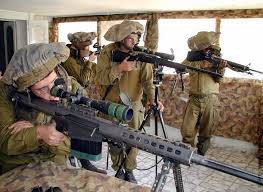Israel’s history of killing Palestinian leaders
"On November 14, two days after Palestinian factions in Gaza agree to a truce following several days of violence, Israel assassinates the leader of Hamas' military wing, Ahmed Jabari, threatening to escalate the violence once again after a week in which at least six Palestinian civilians are killed and dozens more wounded in Israeli attacks. Although Israeli officials know that Jabari is in the process of finalizing a long-term truce, and that he is one of the few people in Gaza who can enforce it, they kill him anyway, marking the start of a week-long assault on Gaza that kills more than 100 Palestinian civilians, including at least 33 children, and wounds more than 1000 others."
Israel's History of Assassinating Palestinian Leaders
The IMEU, Nov 6, 2013

On November 6, several news outlets reported that the widow of former Palestine Liberation Organization (PLO) Chairman Yasser Arafat announced that the results of a Swiss investigation into her late husband's death concluded he was poisoned with polonium, a radioactive substance.
In November 2012, Arafat's body was exhumed in order for medical examiners to take samples of his remains to test for polonium, part of a murder investigation launched by French authorities at the request of Suha Arafat following the discovery last summer of traces of the highly toxic substance on some of his personal effects. In October 2004, after enduring a two-year siege by the Israeli military in his West Bank headquarters, Arafat fell seriously ill. Two weeks later he was transported to a French military hospital where he died. Doctors concluded he died from a stroke caused by a mysterious blood disorder.
At the time, many Palestinians suspected that Arafat was murdered. Over the years, he had survived numerous assassination attempts by Israel, and just six months before his death then-Israeli Prime Minister Ariel Sharon said that an agreement he had made with US President George W. Bush promising that Israel wouldn't kill Arafat was no longer valid, stating: "I released myself from the commitment in regard to Arafat."
Two years prior to that statement, in an interview published in February 2002, Sharon told an Israeli journalist that he regretted not killing Arafat when he had the chance during Israel's invasion of Lebanon in 1982, stating: "I am sorry that we did not liquidate him.'' In 2002, current Israeli Prime Minister Benjamin Netanyahu, then in the opposition following his first term as prime minister (1996-1999), told the Likud party Central Committee: "We must completely and totally eradicate Arafat's regime and remove him from the vicinity... This one thing must be understood: If we do not remove Arafat and his regime, the terror will return and increase. And only if we do remove them is there any chance of turning a new leaf in our relationship with the Palestinians." When Arafat died, Netanyahu was serving as Minister of Finance in Sharon's government.
PARTIAL LIST OF ISRAELI ASSASSINATIONS OF PALESTINIANS
2012 - On November 14, two days after Palestinian factions in Gaza agree to a truce following several days of violence, Israel assassinates the leader of Hamas' military wing, Ahmed Jabari, threatening to escalate the violence once again after a week in which at least six Palestinian civilians are killed and dozens more wounded in Israeli attacks. Although Israeli officials know that Jabari is in the process of finalizing a long-term truce, and that he is one of the few people in Gaza who can enforce it, they kill him anyway, marking the start of a week-long assault on Gaza that kills more than 100 Palestinian civilians, including at least 33 children, and wounds more than 1000 others.
2012 - On March 9, Israel violates an Egyptian-brokered ceasefire and assassinates the head of the Gaza-based Popular Resistance Committees, Zuhair al-Qaisi, sparking another round of violence in which at least two dozen Palestinians are killed, including at least four civilians, and scores more wounded. As it usually does, Israel claims it is acting in self-defense, against an imminent attack being planned by the PRC, while providing no evidence to substantiate the allegation.
The full article is available at IMEU, 6 November 2013
